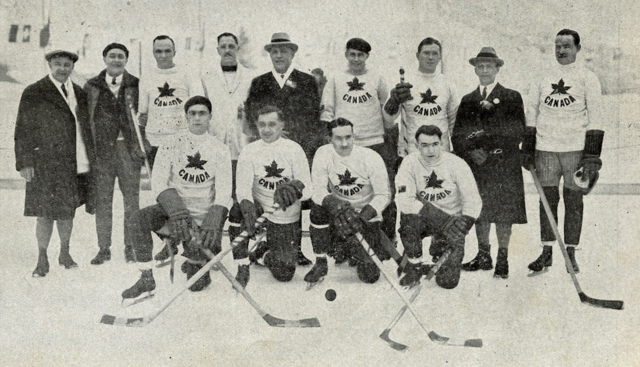IMAGE INFORMATION
EditTeam Canada
Toronto Granites
- Winter Olympics Gold Medal Champions 1924
Semaine Internationale des Sports d'Hiver.
Team Roster
Front Row L to R - Hooley Smith, Bert McCaffrey, Harry Watson, Harold McMunn.
Top Row - Frank Rankin (coach), French Trainer, Beattie Ramsay, Ernie Collett (goalie), Patrick J. Mulqueen (president/chairman Canadian olympic committee), Jack Cameron (goalie), Dunc Munro (captain), William Abraham Hewitt (manager), Sig Slater.
------------------------------------------------------------------------------------------------------------------------------------------
In the first game on January 28, Canada (Granites) beat Czechoslovakia 30-0. It was 22-0 after two periods and the Granites took pity on their opponents in easing up in the third when the puck got hard to see. The losers failed to get a direct shot on goal for the entire game.
"Owing to the sudden advent of darkness the last period was played under electric light," reported W.A. Hewitt, sports editor of the Toronto Star who also was manager of the Granites.
Watson scored 11 goals in the game, 3 in the 1st, 6 in the 2nd and 2 in the 3rd period.
Next up was a game vs Sweden on January 29, and a 22-0 score. Watson had 6 goals.
3rd game played on January 30 vs Switzerland was a 33-0 drubbing and Watson set a Olympic scoring record that will never be broken by scoring 13 goals in the game.
Canada played Great Britain on February 1st in the semi-final, winning 19-2, Watson once again scoring 4 goals.
In the championship final on February 3rd, Canada played the United States team, which had also gone through the tournament undefeated 4-0 while outscoring opponents 74-0.
Canada won the championship game 6-1.
"The Canadians won rather easily," Hewitt wrote in his dispatch home after the final. "Watson, Smith and McCaffery carried the attack to the Americans with great rushes, Ramsay and Munro helping the sweeping offensive out.
"They had Herb Drury's tongue hanging out after the first 10 minutes. Hooley Smith checked the American ace to a standstill. The Canadians played good combinations all the way. Their passing attack was a treat. Their team work was the predominating feature of the victory."
McCaffery scored the first goal on a pass from Watson, who scored the second on a great individual play.
"He dodged the whole American team," Hewitt wrote.
With Slater off for charging, Drury got credit for what would be the lone U.S. goal, leaving it 2-1 after one period.
Goals by Smith and McCaffery made it 4-1 before Munro went through the entire U.S. team to score Canada's fifth goal.
A third-period goal by Watson capped the scoring.
"The whole Canadian team played good Hockey," Hewitt wrote. "Watson, McCaffery, Munro and Smith were brilliant. Ramsay worked very hard and Slater and McMunn fitted in splendidly.
"The ice was sticky and hard skating took a lot out of the boys. Watson was cross-checked across the face in the first minute but played a sensational game with a bleeding mouth. Cameron did well in goal especially on long shots. U.S. forwards could not penetrate the Canadians' defence and shot from outside."
Hewitt credited "much of the success of the Canadian team's showing" to Rankin's excellent coaching.
"Harmony and good fellowship prevailed at all times and the team gave their very best for him," Hewitt wrote.
Harry Watson scored 37 goals, 9 assists in the Olympic tournament.
Albert McCaffrey scored 20 goals in the Olympic tournament.
Hooley Smith scored 18 goals in the Olympic tournament.
Team Captain Dunc Munro scored 16 goals in the Olympic tournament.
Beattie Ramsay scored 10 goals in the Olympic tournament.
Harold McMunn scored 5 goals in the Olympic tournament.
Cyril Slater scored 4 goals in the Olympic tournament.
Medals in all sports were presented during the closing ceremonies. When the Hockey champions stepped forward, aware only that they'd won what was described to them as the world championship, a band played "The Maple Leaf Forever" and Canada's flag of the day, the "Red Ensign" with the official Coat of Arms of Canada, was raised.
NOTE
The International Olympic Committee / IOC decided to hold a separate "International Winter Sports Week" in 1924 in conjunction with the Paris Summer Olympics that were being held a few months later.
In 1926, during the 25th Session of the International Olympic Committee / IOC in Lisbon. the IOC decided that the International Winter Sports Week had been such as success that they retroactively declared it to be the first official Winter Olympics which would thereafter be held every four years like the Summer Olympics.
Thus Canada became the first Gold Medal winners of the Winter Olympics.



























